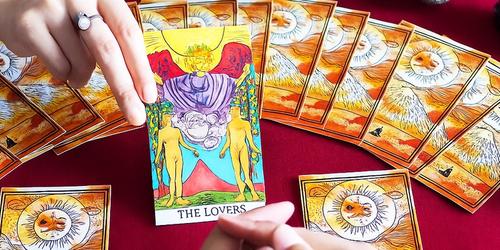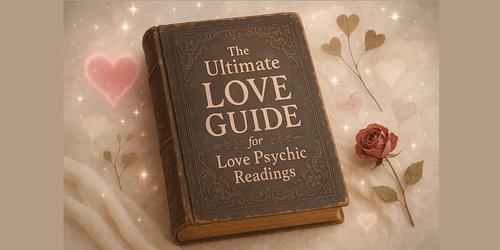
To pay for your reading on your telephone bill, simply call
Instantly message our featured psychics online via psychic messenger.
Click to start
Register now to start your reading online. PSYCHIC MESSENGER- Cheapest psychic service in the UK
- Our readers are available 24/7
- 100% confidential service
- In-depth, concise, personal readings
- Thousands of 5* reviews
Published 27/06/2023 • Updated 01/12/2023 by Joanne Jones
How to Leave a Toxic Relationship?
Being in a toxic relationship can be an emotionally draining and mentally exhausting experience. Unhealthy relationships refer to relationships where one or both partners are emotionally abusive, manipulative, controlling, or violent.
In such relationships, the individuals involved often feel they are trapped and unable to leave an abusive relationship without suffering further abuse or fear of retaliation.
It is essential to understand that leaving this type of relationship is possible and crucial for one's physical and mental well-being.
How to Leave a Toxic Relationship?
To leave a toxic relationship is acknowledging and accepting that it is unhealthy.
This may seem obvious, but many people remain in unhealthy relationships, thinking it is normal or that they can change the other person.
It is essential to realise that toxic behaviour is unacceptable, and change can only occur if the toxic person is willing to take responsibility for their actions and change their ways.
Once you have acknowledged the toxicity of your relationship, it is time to plan how to leave an abusive relationship.
Leaving an abusive relationship can be very difficult, and the process may differ depending on the circumstances and level of any domestic violence involved. However, some general guidelines can still be followed. Read more on how to spot a failing relationship.
Build Support Network
One of the most critical steps in building a support network is recognising the signs of a toxic relationship.
Abusive partners can consistently belittle or have demeaning behaviour, patterns of manipulation or control, and a lack of mutual respect and trust.
It is essential to acknowledge the impact of these behaviours on one's emotional and physical well-being.
Once one recognises the need to leave such a destructive relationship, the next step is to reach out to trusted friends and family members.
These individuals can provide emotional support and a safe space to process emotions and thoughts. Reaching out for support early on and spending time with friends is crucial, as leaving this type of relationship can often be lengthy and challenging.
In addition to loved ones, seeking professional support can be incredibly beneficial.
Therapists, Counsellors, and Relationship Experts can offer professional guidance and online therapy to help individuals develop healthy coping mechanisms and strategies for managing difficult emotions.
Lastly, joining a support group can be a helpful resource as well. Surrounding oneself with individuals who have gone through domestic abuse and similar experiences can provide a sense of community and validation, ultimately leading to empowerment and healing.
Independence
One crucial aspect of leaving a toxic relationship is gaining independence.
This can be achieved through personal development, such as pursuing further education or taking up new hobbies and passions that give you a sense of purpose and fulfilment.
Developing a strong sense of self-worth and confidence is essential, knowing that you can achieve your goals in life.
Get Professional Help
Breaking free on your own can be incredibly difficult when it comes to toxic relationships.
Emotional manipulation, gaslighting, domestic abuse and other passive-aggressive behaviours can make determining what is best for your well-being challenging. That is why seeking professional help is often vital in leaving an unhealthy relationship.
Professional help can come in different forms. A mental health professional can offer a safe and confidential space where the person can discuss their thoughts, feelings, and fears without fear of judgement.
They can help the person identify unhealthy patterns in the relationship, increase their self-esteem, and develop strategies to cope with the stress of leaving the relationship.
A counsellor or social worker is another option. They can offer practical advice and online therapy on managing domestic violence, such as navigating the legal system, accessing community resources, and finding safe shelter.
It is important to note that leaving a bad relationship can be dangerous.
The abuser may retaliate against the person attempting to leave. This is why professional intervention is crucial. Professional help increases the chances of the person safely exiting the relationship and moving on to a healthier and happier life.
Cut Off Contact
Cutting off contact is often the most effective and necessary solution. Recognising the signs that you are in a toxic relationship is essential.
This can include constantly walking on eggshells around your partner, a lack of trust and respect, emotional or physical abuse, and general unhappiness or discomfort.
Once you have identified that you are in a hostile relationship, the first step towards leaving is to cut off contact with your partner.
Cutting off contact means completely severing communication with your partner. This can involve blocking their phone number, deleting them from social media, and avoiding places you are likely to bump into them.
It is important to remember that cutting off contact in a toxic marriage is not an act of selfishness but rather an act of self-care.
When you are in a toxic relationship, your mental and physical well-being is at risk, and cutting off contact is necessary to protect yourself.
Self-Care
Self-care is also an essential component of living and taking care of your physical, emotional, and mental well-being.
This includes exercising, meditating, seeking therapy, eating healthy, and getting enough rest.
Participating in activities that bring you joy, spending time with supportive friends and family, and focusing on positive affirmations are also critical for self-care.
Leaving a toxic relationship requires strength, courage, and often emotional pain, including a willingness to prioritise your well-being and safety.
Understanding that you do not deserve to be treated poorly and seeking support from professionals and loved ones can help ease the process of leaving the relationship.
Additionally, taking care of yourself and developing healthy boundaries will allow you to move forward positively and heal from the painful experience.
What Is a Toxic Relationship?
A toxic relationship is characterised by patterns of unhealthy behaviour that are detrimental to the emotional, physical, and mental well-being of those involved.
One of the hallmark signs is usually characterised by one partner exerting power and control over the other through manipulation, threats, intimidation, constant criticism, and abuse.
Unhealthy relationships can manifest in various forms, such as emotional, physical, financial, and verbal abuse.
Insults, humiliation, gaslighting, and isolation often characterise emotional abuse. Physical abuse involves physical harm, assault, and violence. Financial abuse usually involves controlling access to finances and resources for personal gain.
Verbal abuse means using words to demean, belittle, and undermine the partner's self-esteem.
Research shows that toxic relationships can severely affect those involved in mental and physical health. Such effects may include depression, anxiety, post-traumatic stress disorder, chronic pain, and suicidal thoughts.
This type of relationship can also affect an individual's ability to function effectively in daily life, such as work, school, and social interactions.
Abusive relationships are detrimental to every aspect of life and can be challenging to escape once entrenched.
Recognising the signs of a toxic relationship and seeking professional help early on is essential. If you or someone you know is in a toxic relationship, reaching out for help and support is critical.
Love Readings
If you're looking for guidance on your current relationships or future encounters, love readings from Trusted Psychics may be just what you need.
With years of experience and thousands of successful love readings under their belts, these Trusted Psychics can provide accurate insights into the dynamics of your relationships and help you make informed decisions about your future.
Trusted Psychics can help you evaluate if your current partner is your right choice and provide valuable guidance on building a solid and lasting relationship.
They can identify areas of concern or potential conflicts that may arise and provide insightful advice on how to avoid or manage them. They can also offer essential insights on navigating challenging situations and maintaining a healthy, happy relationship with your partner.
Guidance from Trusted Psychics is not limited to evaluating your current relationship status. They can also provide valuable insights into potential future relationships, helping you identify and attract the right partner to bring you long-term happiness and fulfilment.
With their help, you can better understand yourself and what you are looking for in a partner.
In conclusion, seeking guidance from Trusted Psychics can be a powerful tool for searching for love and companionship.
Their love readings can provide valuable insights into your current relationships and future encounters, helping you make informed decisions and build solid and lasting relationships. Trust their experience and expertise to guide you towards a happier, more fulfilling love life.
FAQs
How Do You Leave a Toxic Relationship When You Still Love Them?
Making the choice to leave a toxic relationship can be a difficult decision, especially if they still love their partner.
Many people stay in unhealthy relationships due to their emotional attachment to their partner, fear of being alone, or a lack of confidence to leave.
When you choose to leave a toxic relationship while still loving your partner, it is essential to recognise the signs of toxicity and the importance of your physical safety.
These can include emotional starvation, manipulation, gaslighting, controlling behaviour, and a lack of trust or respect. Understanding that you're not in a loving relationship is the first step in breaking away from toxicity.
It is important to remember that leaving a destructive relationship takes immense strength and courage. It is a process that often involves setting boundaries, seeking therapy, and possibly even legal intervention.
Communicating your decision to leave with your partner can also be challenging, and it may be helpful to have a support system in place and a solid plan to help you navigate through the process.
In addition to seeking professional help, practising self-care and self-love can also aid in the healing process. Focusing on your well-being and prioritising your mental and emotional health is crucial.
Though it may be difficult to leave someone you still love, it is essential to prioritise your well-being and surround yourself with positivity and support.
How Do You End a Toxic Relationship?
Ending a toxic relationship can be a complex and emotionally challenging process.
Recognising the signs of toxicity in a relationship and prioritising your mental well-being and safety is essential.
If you are in a toxic relationship, it is crucial to understand that you are not alone and that seeking help is a courageous and necessary step.
Many resources are available to support individuals leaving abusive relationships, including hotlines, online therapy, counselling services, and community-based organisations.
One key strategy for ending your relationship is to create a safety plan.
This can involve identifying a trusted friend or family member who can support you during the transition, finding a safe place to stay if needed, and communicating clearly and assertively with your partner about your decision to end the relationship.
It is also essential to seek legal support, particularly when dealing with mental abuse, harassment, stalking, or violence.
This may include obtaining a restraining order or working with law enforcement to address criminal behaviour.
Why Can’t I Leave My Toxic Relationship?
For several reasons, someone may find it difficult to leave a relationship.
Firstly, it could be due to emotional attachment or dependency on the abusive partner. This may be particularly true if the relationship has been ongoing for a long time and the couple has shared many experiences.
The thought of leaving the relationship may bring about feelings of fear, guilt, and uncertainty, which can be hard to overcome, but understanding you're not in a healthy relationship is paramount to your well-being.
Additionally, the toxic partner may use manipulative tactics to prevent their partner from leaving. This could include emotional blackmail, threats, mental abuse, or physical violence.
In some cases, financial dependence may also play a role. For instance, if the toxic partner is the primary breadwinner, the victim may fear losing their financial security if they were to leave.
Furthermore, societal and cultural norms may also influence one's decision to stay in a toxic relationship. For instance, some cultures may view divorce or separation as a failure or taboo, which can cause victims to remain in the relationship despite the abuse they are experiencing.
How Do You Cut Off a Toxic Person You Love?
Cutting off a toxic person you love can be an emotionally challenging task that requires serious consideration and preparation.
When we form close relationships with people, we tend to invest a great deal of time, energy, and emotions into them, making it difficult to distance ourselves, even when the relationship harms our well-being.
The first step in cutting off a toxic person you love is to recognise the warning signs of toxicity. These may include emotional abuse, manipulation, lying, gaslighting, and constant negativity.
Toxic people can drain your energy and make you doubt your abilities and worth, which can seriously impact your mental health.
Once you have identified the person as toxic, setting boundaries and communicating your intentions firmly but kindly is crucial.
This means being clear about your feelings and expectations while avoiding getting drawn into arguments or emotional blackmail. It is important to remember that it’s your decision to cut them off, but you may choose to explain your reasons politely and respectfully.
How To Contact A Trusted Psychic
Phone a live Psychic 24 hours a day
View all our live phone psychic and tarot readers online.
View All Live readersMessage a live Psychic 24 hours a day:
View all our live messenger psychic and tarot readers online.
launch messengerRecent Articles From the Trusted Psychics Blog

Are Trusted Psychics the Key to Understanding Your Love Life?
Confused about love or repeating relationship patterns? Discover how psychic love readings help people gain clarity, emotional insight, and love guidance.

How Can a Psychic Love Reading Help Your Love Life?
Discover how accurate psychic love readings bring clarity, soulmate insights, and healing. Trusted Psychics are available 24/7 for guidance & love insights.

3 of Hearts in a Love Reading and Its Meaning
Discover the meaning of the 3 of Hearts in a love reading. Learn what this card reveals for relationships, soulmates, twin flames, emotional growth & breakups.

Psychic Love Readings: What They Reveal About Your Relationship
Discover with Trusted Psychics what psychic love readings are and what they reveal about your relationships, from new to existing relationships & ex-partners.

What Is a Psychic Love Reading? The Ultimate Love Guide
Explore our ultimate love guide on psychic love readings & how they can help you with finding your twin flame, soulmate, new love, & whether an ex will return.

The Ultimate Guide to Finding Your Soulmate Through Tarot
Here's the ultimate guide to finding your soulmate through Tarot. Find out what The Lovers, 2 of Cups & 4 of Wands Tarot cards mean for finding your soulmate.

